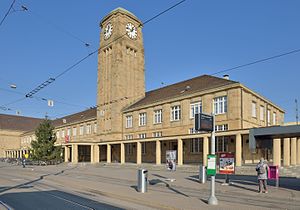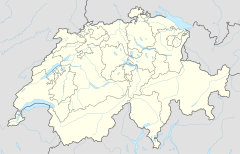| Basel Bad Bf Basel Badischer Bahnhof | |||||
|---|---|---|---|---|---|
| Bf | |||||
 | |||||
| General information | |||||
| Location | Schwarzwaldallee 200 CH-4016 Basel Basel, Basel-Stadt Operates as if in Baden-Württemberg Switzerland / Germany | ||||
| Coordinates | 47°34′03″N 7°36′26″E / 47.5674°N 7.6071°E / 47.5674; 7.6071 | ||||
| Owned by | Bundeseisenbahnvermögen (since 1994); Grand Duchy of Baden State Railway (until 1920), Deutsche Reichsbahn (1920-1949), Deutsche Bundesbahn (1949-1993) | ||||
| Operated by | DB Station&Service & DB Netz | ||||
| Line(s) | |||||
| Platforms | 5 side platforms | ||||
| Tracks | 10 | ||||
| Train operators | |||||
| Construction | |||||
| Accessible | Yes | ||||
| Other information | |||||
| Station code | - | ||||
| DS100 code | RB | ||||
| IBNR | 8000026 | ||||
| Category | - | ||||
| Fare zone | |||||
| History | |||||
| Opened | 19 February 1855; 169 years ago (1855-02-19) | ||||
| Electrified | 13 September 1913; 111 years ago (1913-09-13) when the present edifice opened | ||||
| Previous names | 1935-1948 Basel Deutsche Reichsbahn or Basel DRB | ||||
| Services | |||||
| |||||
Basel Badischer Bahnhof (Basel Baden Railway station; abbreviated Basel Bad) is a railway station in the Swiss city of Basel 2 km south of the Germany–Switzerland border. Despite its location, its land is an enclave of the EU Customs Union of Germany, with German rules applying to its rail traffic and infrastructure, the latter owned and operated by the respective German entities so that, for example, the station's clocks bear the "DB" logo of Deutsche Bahn.
The station is the city's second-largest, the larger being Basel SBB railway station operated by the Swiss Federal Railways (SBB CFF FFS). Basel Bad is served by the tri-national Regio S-Bahn Basel and by long-distance trains to and from Freiburg, Offenburg, Karlsruhe, Mannheim, Frankfurt, Amsterdam, Hamburg, Berlin and other cities, and is listed as a Swiss Heritage Site of national significance.
History
| This section does not cite any sources. Please help improve this section by adding citations to reliable sources. Unsourced material may be challenged and removed. (October 2024) (Learn how and when to remove this message) |
In March 1838, the Grand Duchy of Baden State Railways started working on a railway line from Mannheim via Heidelberg, Karlsruhe and Freiburg im Breisgau. This line was called Badische Hauptbahn (Baden Main Line) or Rheintalbahn (Rhine Valley Line). A Swiss railway commission desired a continuation of the line into Basel and contacted the Grand Duchy of Baden in 1842.
In January 1851, the Rheintalbahn line reached the village of Haltingen, close to the Swiss border. Since the two governments had not agreed about how to build the station in Basel yet, the passengers were transported across the border with hackney carriages.
Finally, a treaty between the government of Baden and the Swiss Confederation entered into force on July 27, 1852, and has remained so into the present. The start of construction was further delayed, however, by the Swiss insisting on a terminal station and the Badische Staatseisenbahnen insisting on a through station in favour of the planned extension of the line towards Waldshut.

The first Baden Railway station of Basel was built as a through station at nowaday's Messeplatz square about 800 meters west of today's one. The line from Haltingen to Basel was opened on February 19, 1855, with a temporary wooden station building. A further line to Konstanz in Baden was connected to the southern end of the station in 1856, and by April 10, 1859, Switzerland and Baden had finally agreed to build a permanent station, of which the construction started in May. The street entrances of the station building opened to nowaday's Riehenring street. In 1875, the Basel Connecting Line to Basel Swiss station was opened, running out of the Baden station parallel with the railway to Konstanz.
The increase of railway traffic in the beginning of 20th century required larger facilities. To get space for the urban development of Kleinbasel, the government of Basel insisted on a new station on a new site. It was chosen straight north northwest of the railway bridge across the Rhine. The station was moved to its current location between 1906 and 1913.
Special customs and regulatory territory
| This section does not cite any sources. Please help improve this section by adding citations to reliable sources. Unsourced material may be challenged and removed. (October 2024) (Learn how and when to remove this message) |

Although the Badischer Bahnhof is located in Switzerland, due to the 1852 treaty between the Swiss Confederation and the Grand Duchy of Baden (one of the predecessors of today's Germany), the terrain under its largest part, encompassing the platforms and part of the passenger tunnel that lead to the German/Swiss customs checkpoint, forms a special customs territory, which is both an exclave of the European Union Customs Union and an enclave within Liechtenstein–Switzerland customs union. The shops in the station hall are, however, located in Liechtenstein–Switzerland customs union, and the Swiss franc is used as the official currency there (although the euro is accepted for train tickets). Customs checks are performed in a tunnel between the platforms and the station hall, while passengers of international trains transiting to Basel SBB may be subjected to on-board customs checks. Immigration checks have in turn been abolished since Switzerland joined the Schengen Area in 2008.
Except for the Basel connecting line, all lines served by the station along with traffic on them are under purview of the German Federal Railway Authority and the European Union Agency for Railways, being owned along with the station by the German Bundeseisenbahnvermögen, operated by DB Netz and DB Station&Service, regulated by the German Federal Network Agency and available exclusively for trains operated by German-licensed railway undertakings, including Deutsche Bahn (DB Fernverkehr & DB Regio), ÖBB, Swiss Federal Railways and the Basel S-Bahn.
Layout
Basel Badischer Bahnhof has five side platforms serving ten tracks. The platforms are reached from two passenger tunnels leading from the main station building and from the southern tower-wing.
Services
As of the December 2023 timetable change, the following services stop at Basel Badischer Bahnhof:
Long distance services
| Line | Route | Frequency | ||
|---|---|---|---|---|
| ICE 12 | (Chur – Zürich –) | Basel SBB – Basel Bad Bf – Karlsruhe – Mannheim – Frankfurt – Göttingen – Hamburg – Kiel | 120 min | |
| (Interlaken Ost – Bern –) | ||||
| ICE 20 | (Zürich –) Basel Bad Bf – Baden-Baden – Karlsruhe – | Frankfurt – | Erfurt – Leipzig – Berlin Südkreuz – Berlin – Berlin Gesundbrunnen | |
| Hildesheim – Wolfsburg – Berlin – Berlin Südkreuz | 120 min | |||
| Mannheim – Stuttgart | single service | |||
| ICE 43 | Basel SBB – Basel Bad Bf – Offenburg – Karlsruhe – Wiesbaden/Mainz – Köln Messe Deutz – Düsseldorf | 120 min | ||
| ICE 60 | Baden-Kurier: Basel SBB – Basel Bad Bf – Offenburg – Karlsruhe – Bruchsal – Stuttgart – Ulm – Augsburg – München | one train pair | ||
| ECE 85 | Milano – Lugano – Zürich – Basel SBB – Basel Bad Bf – Ringsheim/Europa-Park – Karlsruhe | → Mannheim → | Frankfurt | one train pair |
| ← Darmstadt ← | ||||
| Nightjet
Zürich – Berlin |
Zürich – Basel SBB – Basel Bad Bf – Offenburg – Karlsruhe – Frankfurt Süd – Leipzig (train split) – | Dresden – Decin – Prague | single service | |
| EuroNight Zürich – Prague |
Halle – Bitterfeld – Berlin | |||
| Nightjet Zürich – Hamburg-Altona |
Zürich – Basel Bad Bf – Freiburg – Karlsruhe – Heidelberg – Frankfurt Süd – Hannover – Bremen – Hamburg – Hamburg-Altona | single service | ||
| Nightjet Zürich – Amsterdam |
Zürich – Basel Bad Bf – Freiburg – Offenburg – Bonn-Beuel – Köln – Utrecht – Amsterdam | one train pair | ||
| FLX 10 | Basel Bad Bf – Freiburg – Offenburg – Karlsruhe – Heidelberg – Darmstadt – Frankfurt Süd – Erfurt – Halle – Berlin | one train pair | ||
Regional services
| Connection | Line | Frequency | Operator |
|---|---|---|---|
| RE 3 | Basel Bad Bf – Bad Säckingen – Schaffhausen – Überlingen – Friedrichshafen Hafen | 60 min | DB Regio Baden-Württemberg |
| RE 7 | (Basel SBB -) Basel Bad Bf – Weil am Rhein – Müllheim – Freiburg – Emmendingen – Herbolzheim – Lahr – Offenburg – Baden-Baden – Karlsruhe | 60 min | |
| RB 27 | (Basel SBB -) Basel Bad Bf – Weil am Rhein – Müllheim – Freiburg – Emmendingen (– Lahr – Offenburg) | 60 min | |
| RB30 | Basel Bad Bf – Laufenburg – Waldshut – Lauchringen (– Erzingen) | 30 min | |
| S6 | Basel SBB – Basel Bad Bf – Lörrach – Schopfheim – Zell (Wiesental) | 30 min | SBB GmbH |
See also
References
- Eisenbahnatlas Deutschland [German railway atlas] (in German) (Updated ed.). Cologne: Schweers + Wall. 2020. p. 101. ISBN 978-3-89494-149-9.
- "Stationspreisliste 2025" [Station price list 2025] (PDF) (in German). DB Station&Service. 28 November 2024. Retrieved 5 December 2024.
- "Zonen- und Linienplan" (PDF). Tarifverbund Nordwestschweiz. 13 December 2020. Retrieved 13 February 2021.
- "RVL Tarifzonenplan". Regio Verkehrsverbund Lörrach. December 2019. Retrieved 10 February 2021.
- Swiss inventory of cultural property of national and regional significance (1995), p. 78.
- "History – Basler Verkehrs-Betriebe". Retrieved 2024-12-31.
- "Basel Bad Bf" (PDF) (in German). Retrieved 28 February 2021.
- "Abfahrt: Basel Bad Bf" (PDF) (in German). DB Station&Service. 13 December 2020. Retrieved 28 February 2021.
